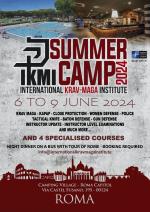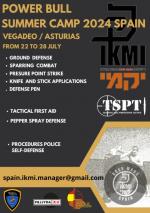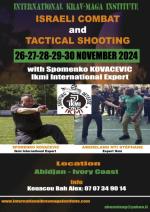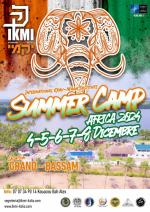Kids Krav Maga
Faced with a growing demand for self defense classes for kids from many parents, Ikmi considered worthwhile to propose courses for young athletes to be held in approved centers and with instructors specifically trained.
The Ikmi Commission has, in conjunction with the Enna's Kore University Research Area, developed a dynamic program for the children to enable them to start their own defense, to motivate them to improve their overall physical fitness and to enrich them with positive experiences.
The program will be inventive, reasonable and custom-made so that small athletes can see their progress and be proud of their path. The class format is structured to be dynamic, fun and stimulating. Instructors think of each course to match the attitudes and feelings of the children. With this program that suits the very young participants, the IKMI instructors will be able to be vigilant for their own safety, to strengthen their body through free-of-charge exercises and games, to build a strong personality and to create gratifying experiences.
Age groups: 8-11 years old - 12-14 years old
The program has a complete level system to award their efforts and an intermediary control system of progress motivating the young athletes and keeping them focused on their technical growth to reach the next level. The levels will be visible through the t-shirts they wear: white, yellow, orange, blue, brown and black.
Playful approach
The game is a basic necessity common to all men of any age, time period, and culture. In its social dimension, characteristic features must be recognized in a freely chosen and therefore enjoyable activity.
In children, however, this activity has very important cognitive connotations, and plays a decisive role in its global maturation. In the game, the children live their own experiences without anxiety or stress. The game makes possible the realization of one's own psycho-emotional needs. The game is therefore a context of communication and learning of social behaviors, an indispensable activity to maintain a good neuro-dynamic equilibrium.
In the game, every relationship with reality is eliminated so that action and interaction will happen naturally and spontaneously. The game also accomplishes those neuro-motoric conditions that, thanks to the ability to realize multiple experiences, allow different modes off fulfillment of the movement in coordination, precision, functionality and efficiency. The most important functional prerequisites are:
- Acquisition and control of the equilibrium (static, static-dynamic, dynamic); - Stabilization and control of laterality; - sense-motor coordination; - Space-time organization; - Postural control and general dynamic coordination.
The gestures in the game are placed in a ludic context without any nature of extreme specificity and monotony. The gestures in the game have the goal to arouse interest and curiosity in learning. Wide space is always reserved for the improvement of all motor skills, especially with group or partner exercises, team games, pairs, etc.






